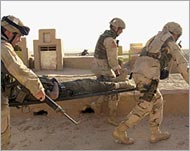Mounting US deaths take their toll
The number of US troops killed in Iraq is steadily approaching 1000, yet it remains unclear what impact that number will have on public opinion.

In early September of last year, the US had lost nearly 300 troops in Iraq and many political experts were questioning how long the American people would accept the slow “drip-drip” of casualties.
Conventional wisdom at the time suggested the public might tolerate ongoing fatalities as long as they believed the Bush administration had a definitive exit strategy and a plan for establishing a secure, democratic Iraq.
One year and nearly 700 more deaths later, Americans’ verdict on the war continues to be mixed.
Some analysts say the crossing of the 1000 figure could spark a period of intense public reflection over the current state of US operations in Iraq, after several months during which the issue of casualties fell below the radar screen for many Americans.
“It [1000 US casualties] becomes a salient threshold for people rising out of their slumber and taking another look at the situation,” Feaver said. “There will be another gut check.”
Evenly divided
As of September, 979 US troops have been killed in Iraq and nearly 7000 wounded.
Jay Farrar, vice president of external affairs at the Center for Strategic and International Studies, said the figure of 1000 casualties could be significant because Americans “tend to want to quantify issues by numbers”, and that it’s “an easy way to reference in peoples’ own minds what something means.”
 |
|
Polls say national security issues |
“I think when you reach a level of 1000 casualties in a war against a country that presented very little direct threat to the United States, that presents an opportunity for discussion among some people who may have been inclined to question our motives,” Farrar said.
While a recent survey by the Pew Research Center showed that six in 10 Americans believe President Bush does not have a successful plan for stabilising Iraq, the public appears to be evenly divided over the question of whether the war was worth the costs involved.
In a recent NBC News/Wall Street Journal poll, 49% of registered voters said removing Saddam Hussein from power had not been worth the cost in terms of money and casualties, while 43% felt it was worth it.
In a recent Gallup Poll, however, 49% said the war had been worth fighting and 48% said otherwise.
Breaking ranks
Farrar said his own research indicated that opposition to the war is growing.
“My numbers show that a rising percentage of the American public is starting to question the cost of [the war] in terms of lives and dollars,” he said.
Lawrence Korb, a former defenxe department official in the Reagan administration and currently a senior fellow at the Center for American Progress, said “more people are beginning to say, ‘No, this war was not worth the cost’.”
 |
|
The psychological significance of |
Korb said the recent statement by retiring Republican Congressman Doug Bereuter that the war in Iraq was “a mistake”, is a sign that even some Bush supporters may be breaking ranks.
Bereuter, who until recently served as the vice chairman of the House Intelligence Committee, issued a four-page statement criticising the administration’s use of faulty prewar intelligence and lamenting the conflict’s death toll.
“The cost in casualties is already large and growing, and the immediate and long-term financial costs are incredible,” said Bereuter, who voted for the congressional resolution authorising the president to invade Iraq.
It remains unclear, however, whether Bereuter’s statement is in line with mainstream America.
Sting of loss
Frank Newport, editor and chief of The Gallup Poll company, pointed to his organisation’s recent surveys which show that public sentiments about Iraq are increasingly favourable.
“The public is gradually becoming somewhat more positive about the US role in Iraq,” he said.
|
“The public is gradually becoming somewhat more positive about Frank Newport, |
Whether the growing number of US casualties will sway opinions is less certain, he said.
A Gallup Poll conducted on August 23-25 asked voters how their views on the US troop presence in Iraq would change when the number of casualties surpassed 1000. While 37% said it would convince them that the administration should “intensify efforts to withdraw” US forces, 58% said it should not affect US policy towards Iraq.
Some experts said the US death toll has not yet reached the level where average American households feel the personal sting of loss.
Attitudes
“The number of communities that are being impacted [by the casualties] is not so large that it’s having an impact on the larger population in the country,” Farrar said.
 |
|
How long the public will tolerate |
Such would appear to be the case for Tim Johnson, a retired construction worker in Maryland who said the US casualty rate has not changed his attitude on the war.
“I think the loss of life in Iraq is a tragic thing,” Johnson said. “But compared to Vietnam, the casualties are relatively low and I think we needed to get rid of Saddam Hussein.”
Susan Miller, on the other hand, said she initially supported the war but never expected the US would lose this many troops to the post-combat insurgency.
“Given the fact that we haven’t found any weapons of mass destruction, I don’t think I would have supported the war had I known so many American soldiers would be killed,” said Miller, a freelance writer in Virginia.